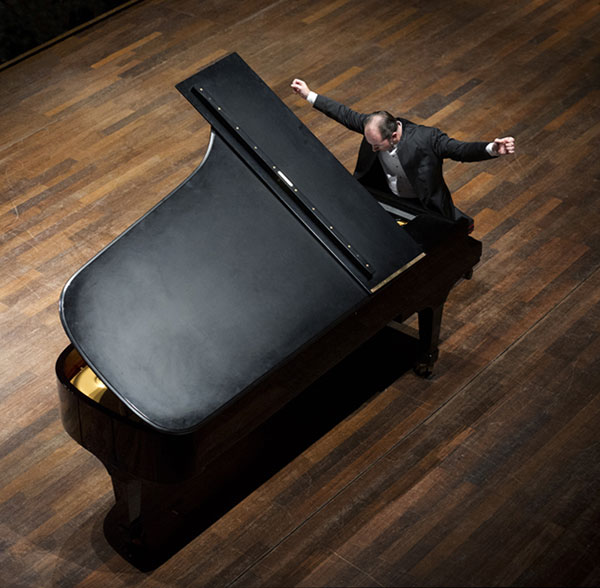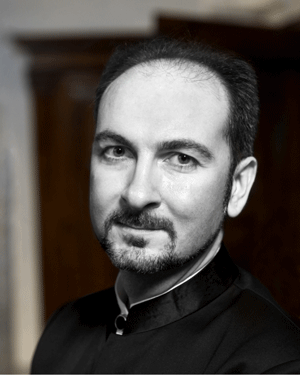Pianist Jura Margulis has won international acclaim for his compellingly communicative performances, as well as for the range of his tonal palette and his consummate virtuosity. He has performed around the world for 35 years and has recorded twelve CDs covering a wide spectrum of repertoire, with the latest CDs to be released this spring. Since 1999 he has taught at the University of Arkansas and was named the inaugural holder of the Emily J. McAllister Endowed Professorship in Piano in 2008. He has performed at venues ranging from the Berlin Philharmonic Hall to the Hollywood Bowl and, in a halftime performance for football fans, at the Reynolds Razorback Stadium. it has been more than two years since he last performed in Fayetteville.
Beginning at 5 p.m. on Thursday evening, April 3, 2014, Jura Margulis will discuss his repertoire selection with students and music lovers, then perform an intimate “house concert” in the Honors Student Lounge in Ozark Hall, with a reception to follow. This special evening with Jura Margulis is the latest event in the Honors College Invites series, in which renowned thinkers and doers share their craft with the campus and community. Join us! (Be sure to R.S.V.P. at honorscollege.uark.edu/invites and plan to come early, as seating will be limited.) Below, Margulis recalls his earliest encounters with the piano, and shares what he most enjoys about his career now.
Question: What are your earliest memories of the piano, and when did you start learning to play?
Answer: My father was a pianist, and my mother is a pianist, and my grandfather was a pianist, so music was always around the house, always surrounding me. There’s a picture of me, I must be 6 or 8 months old, a chubby little kid, at the piano. My father was a great piano pedagogue and pianist, so when he played with me, he played with me at the piano – he didn’t do the kind of games parents usually do with children. I’m in his lap, in this picture.
I started learning the piano specifically when I was six years old. My mother is a specialist piano teacher for children. My father is definitely a specialist for adults, not for children, so I started with my mother. I remember exactly where and when: We were emigrating from Russia, in 1974; it was in a small church in Rome. My father became friends with the pastor there, Don Paolo, who was interested in music. We didn’t have a piano at this time, having just emigrated from Russia. The Russian school, which is what I grew up in, has a long-standing tradition and methodology. It’s very regulated – it’s scales and arpeggios, and only repertoire by great composers. You don’t play songs – you start right away with Bach and Schumann and Tchaikovsky and Prokofiev and Shostakovich and Mozart. All of these composers wrote very very small pieces for children and beginners also.
Question: What music will you play at your concert at Ozark Hall?
Answer: The program will partially be transcriptions and adaptations, some of which are entirely my own. There aren’t many pianists actually alive today who do that; it’s a particular art form of the old virtuoso pianist tradition. One piece is, for example, the final choir of the St. Mathew Passion by Johann Sebastian Bach, which is a piece for orchestra and two huge choirs; there are over 100 people on stage. To play this on a piano, it’s a very interesting thing! It is a challenge, let’s say.
The way I come to this is: I listen to music, for example the St. Mathew Passion, and when I heard this last choir, it moved me to tears. And eventually I want to play it myself on the piano. I don’t want to depend on recordings to have this relation with this music. We have had recording technology for a much shorter time than the music that we play exists, by far. For most of the time that it has existed, the only way to experience the St. Mathew Passion, short of going to a concert, which in previous times did not happen that often, was to play it yourself. And that’s exactly what I’m doing.
The program is quite diverse, from Schumann through Bach, through Mozart, through Puccini to Liszt. It’s quite a range of styles, really, and even the physical way to play this music, it’s distinctly different. The Liszt Mephisto Waltz [that closes the program] is the most typical virtuoso war horse piece.
Question: You have performed literally around the world, since you were nine years old. Do you ever get nervous before a performance?
Answer: You know, about ten years ago, I ran a marathon. I prepared quite extensively, obviously, and I remember the anticipation, and the kind of butterflies in the stomach, in the early morning before that run. And it was entirely positive, the feeling. Because it was anticipation of something that’s joyous, you know, glorious. In no way the feeling of danger, or uncertainty, because nothing can happen if you’re well prepared [laughs].
So no, I don’t get nervous, in that sense. I’m focused. I’m like a bow that is taut, about to release the arrow; that’s how I feel before a performance. It’s like I’m about to unleash what I am born to do.
Question: What do you find rewarding about teaching?
Answer: Teaching is a fundamental, core component of my artistic endeavor, I would say. It’s a family tradition, to teach the instrument. And it does follow the great examples of the great teachers of the past, who were all also great performers. One of the greatest and most important teachers of all time was Franz Liszt himself. And he also happened to be one of the greatest pianists of all time. And my pedagogical pedigree traces right back to him. I was raised as a pianist pedagogue. So teaching is for me incredibly important. Not only to share with the next generation the knowledge and the tradition that I possess and personify, but also to carry the torch of a most valuable cultural tradition to the next generation, and the future.
I write about all things piano, pedagogy, music, art, and culture in my online blog Pianist to Pianist (www.pianisttopianist.com) and in the culture section of the Huffington Post. The content of PtoP is also the foundation of a book I am currently editing for publication.
Question: What have you enjoyed most in your career as a concert pianist, and what have you found most frustrating?
Answer: I think one of the most difficult things in this path, is that in most other professions, the professional endeavor and some kind of spiritual self search are not necessarily the same thing. In our case it is absolutely the exact same thing, so one is very exposed, personally. It’s not a job, it’s a calling, always. And so, to develop as an artist is a difficult path, because it’s also about finding one’s self. One has to be prepared on this path, to encounter, well – plateaus. The only way to mastery is to endure these plateaus and constantly strive for excellence. It’s an ongoing process – I constantly learn new things.
Now for the positive aspects, where to start? It’s a privilege, a blessing, to work within a field that has so much meaning, so much tradition. Art is the expression, the signature of a civilization, and I feel I’m part of this, actively, as well as historically. It’s a very, very difficult path – but the satisfaction from doing something where who you are and what you do are the same thing is a rare gift. I feel lucky; I don’t take it at all for granted.
I hear sometimes, well you know, you had a father who was a great pianist and pedagogue, so you had it given to you. Not true. This kind of thing is never given, it’s always the result of hard work, 10,000 hours to start. I practiced, and I still practice, very, very much!


